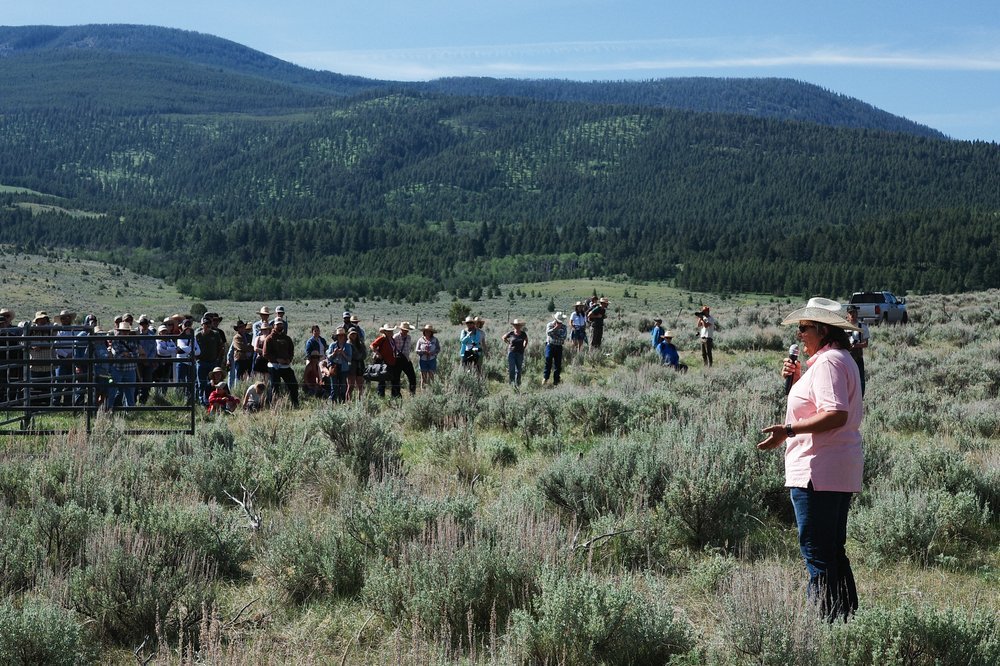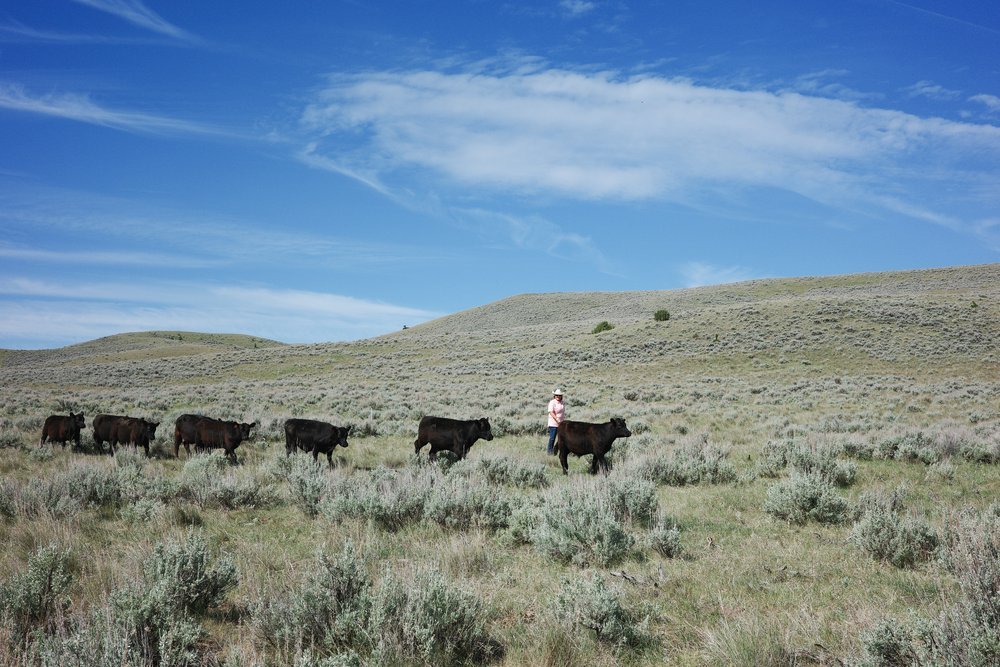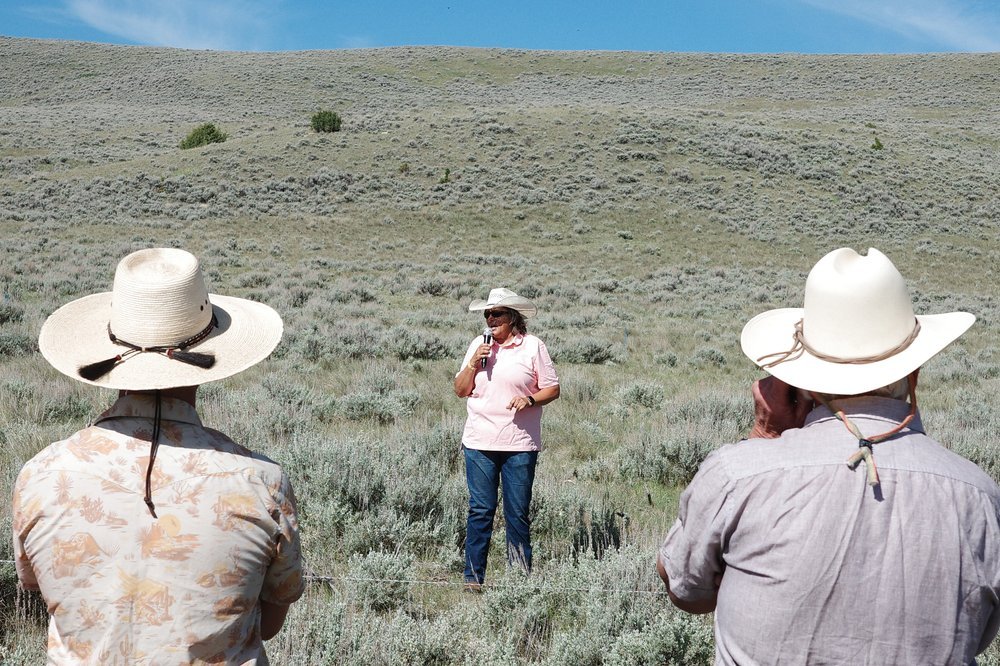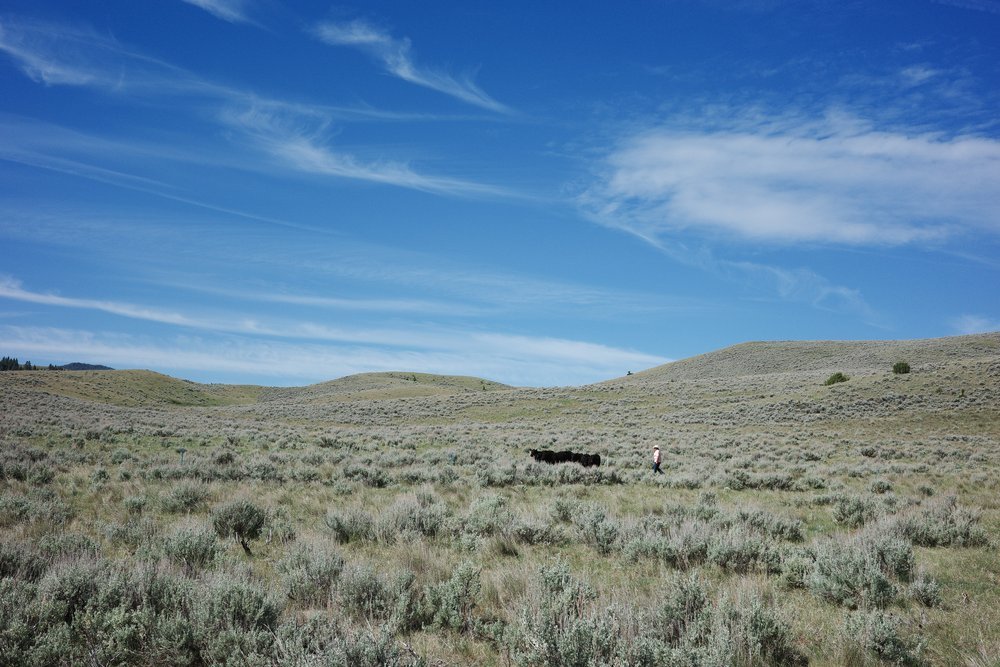In the Quiet of the Fields
Exclusive Q&A with Dawn Hnatow: Her Journey to Low-Stress Ranching
In the heart of Montana, where the summer sun floods every inch of the landscape, where the tiny fingers of sagebrush grasp at you as you walk by, a large group of ranchers and curious onlookers, gathered for a lesson that would challenge long-held paradigms around cattle handling, with a woman leading front and center.
The Old Salt Festival in Helmville, Montana, welcomed its second year, gathering folks out on the Mannix Family Ranch for food, music, and, most importantly, education. The highlight? A hands-on demo, sponsored by Women in Ranching, on low-stress livestock handling by the renowned Dawn Hnatow, owner and founder of Cattle Up Stockmanship.
Against the backdrop of rolling hills and expansive skies, Dawn Hnatow stood ready next to a small group of anxious steers, grounding her audience who stood behind and leaned against the railings of the roundpen that was surrounding her and the animals. Her methods, influenced by the legendary and personal mentor Bud Williams, advocate for a fundamental shift in perspective—one that prioritizes understanding oneself to deepen understanding and cooperation with the animals.
"We have to consider the animal in the equation when it comes to trying to do our day-to-day work that needs to be done.”
Throughout the demonstration, Dawn emphasized that if it seems unglamorous, it means you were doing it right. This technique demanded patience, stillness, and, most importantly, self-awareness. Dawn explained that she doesn’t offer demonstrations much anymore because people are hoping for and expecting the impossible — something big and exciting to happen — which puts unfair pressure on the animals and the instructor.
One memorable moment occurred when Hnatow shared a personal story about her father on their family ranch. Despite traditional methods, she suggested a different approach to prevent cattle from breaking away. Her strategy proved successful, illustrating the power of low-stress handling and leaving her father astonished.
Though it wasn’t a change her father stuck with, she was proud to see that her simple suggestion had worked, and the cattle flowed through the gate with ease at a place that often caused the family grief. However, after that initial effort, Dad reverted to his old tricks and persisted in doing things the hard way. All us ranchers in the audience could relate well to this story of working with our own families.
In Conversation: An Exclusive Q&A with Dawn Hnatow
WIR: So, something we love to always start by asking folks is, what is your tie to the land?
Dawn: I was born and raised on a ranch. And right from childhood on, you know, it’s in the bone now. I've always had a love for open country, nature, and the people responsible for taking care of it. I'm deeply attached not just to land I've had control of but also to places like this. Being able to spend time here with the people, animals, and nature is truly a blessing.
WIR: Absolutely. With this specific demo, we’re curious to know what the biggest takeaway is that you hope folks watching and observing will take home and implement in their own process?
Dawn: I hope people come to understand that we must consider the animal in the equation when doing our day-to-day work. If animals don’t understand what’s being asked of them, they likely won’t respond the way we want. As humans, we are responsible for the outcome, so it’s up to us to change what we’re doing and learn how to work with these animals so they can be comfortable doing what we need them to do. We get our job done, and they do what we ask comfortably. Everybody wins.
WIR: We loved the anecdote you shared earlier about presenting this low-stress technique to your dad. Could you retell that story for us? Also, from your perspective, what did the outcome look like? Did it feel like an "I told you so" moment?
Dawn: On our ranch, there was a specific area where we gathered the cattle. It was a hill with a narrow, steep trail leading into a valley. Every time we approached, the cattle would break away and dash down that trail. My dad’s instinct was to ride up and block their escape. Little did he know, this tactic only made them turn and head for the opening he inadvertently created.
After working with Bud for some time, I finally convinced him to try something different. Instead of blocking the usual escape route, I asked him to ride up the opposite side. And of course, he looked at me like I was on something strange, but decided to humor me for the day. As we gathered the cattle and headed downhill, I could see him tempted to revert to his old ways. But he held steady and rode up the other side. The cattle calmly passed the usual escape point and continued into the open. My dad turned to me with a shocked expression, and I wished I had captured it on video! Despite his success that day, he couldn’t replicate it next time; old habits die hard.
WIR: That’s funny.
Dawn: It was really funny.
WIR: What was the conversation immediately after? Did he discuss it, or was it more of an acknowledgment with a silent agreement to never bring it up again?
Dawn: He didn’t say much, and I didn’t want to say "I told you so." Instead, he said, "Well, that was an easy gather."
WIR: We’re curious to know, as a woman in ranching and with our audience increasingly younger, what advice would you give your younger self looking back on your life now?
Dawn: I would say to anyone who dreams of doing this for a living: chase it hard because it's been the most rewarding, fulfilling, wonderful experience for me. I've been blessed in many ways, not the least of which was my exposure to Bud. It totally changed the trajectory of my life, you know?
“Going from working in a feedlot and wondering what the future held for a woman there, to realizing the sky's the limit—it's such a rewarding way of life that it's worth the sacrifices.”
I feel for younger generations who think money is everything, because I know plenty of wealthy people who are very unhappy. So if it’s your dream, if it’s something that you wish to do, find a place where you can do it and learn everything you can. You'd be shocked to know what opportunities will present.
WIR: And finally, we love asking this question: What's something about your work that you love but rarely get asked about?
Dawn: Oh, that’s a good question. For me, it’s about witnessing how this learning process can really change human relationships. I work with a lot of families and crews where there’s often a lot of tension and anxiety during production events because they're so volatile and unpredictable. Seeing these transformations in people’s lives, alongside benefiting the animals, which is my primary goal, is just really fulfilling and a lot of fun.
“It’s so rewarding when I get emails and texts from people saying things like, "Today's cattle work went smoothly; no one got upset, and even the kids stayed engaged for the whole process."
WIR: Dawn, thank you for this invaluable low-stress livestock demonstration and for taking the time to chat with us today. How can people find you and follow along on your journey?
Dawn: You can connect with me through my Facebook page, on Instagram, and my Website, Cattle Up Stockmanship. All my contact information is right there. If you have any questions or need help with anything, please contact me. I'll do what I can.
We extend our heartfelt thanks to Dawn and the Old Salt Festival team for inviting us to sponsor such a meaningful demonstration.
Looking ahead, we are excited to announce the upcoming 2nd Sustainable Ranching Event hosted by Colorado State University in Fort Collins, Colorado.
Limited tickets available, so reserve your spot quickly!







